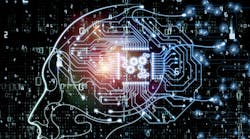More than sixty years after artificial intelligence was first launched, it is finally being used to streamline and boost business efficiency and productivity.
Today, the building blocks are in place for AI to deliver results. Sensors track products at every stop of their life cycle from the shop floor to customer sites. Cloud solutions enable the collection of millions of data points to create the foundation for machine learning. Personal assistants are readily available to simplify and accelerate information retrieval for more informed decision making.
Here are just a few examples of how AI is changing ERP.
1. Warehouse Management. AI and machine learning can test hundreds of demand forecasting models and possibilities with a new level of precision while automatically adjusting to different variables such as new product introductions, supply chain disruptions or sudden changes in demand. Using AI systems, every single part can be tracked from when it’s first manufactured to when it’s assembled and shipped to an end customer.
Walmart cut taking physical inventory from one month to 24 hours by using sophisticated drones that fly through the warehouse, scan products, and check for misplaced items. Using algorithms that learn from experience to optimize logistics, BMW follows a part from the point it was manufactured to when the vehicle is sold—from all of its 31 assembly facilities located in over 15 countries.
2. Financial Management. Bots can automate repetitive accounting functionsm including categorizing invoice information into various accounts, and even distinguishing between a monthly phone bill and a payment towards a phone purchase. AI can close operations and automate monthly, quarterly and year-end processes, even comparing account balances between various independent systems and verifying statements and reports for accuracy. Using machine learning, bots can even learn from different human input to make better judgments and adapt to the behavior patterns of different accounting professionals.
3. Customer Service. AI solutions can learn from customer service history, enabling chat bots to answer customers’ inquiries more cost-effectively, quickly, and consistently. The quality of customer service can also be improved by integrating real time data from different customer-facing departments, providing a 360-degree view of the customer. When customer requires field service, an AI solution can use knowledge about the required skill set and required parts to assist with the planning and scheduling of service calls.
4. Human Resources. Talent acquisition software can scan, read, and evaluate applicants and quickly eliminate 75% of them from the recruiting process. AI systems can successfully plan, organize, and coordinate training programs for all staff members. By determining individual affinities and revealing who should get a raise or who might be dissatisfied with the life-work balance, AI systems can be proactive and solve the problem of employee churn before it happens.
5. Sales Automation. Currently, sales automation systems are about tracking, reporting and team productivity. The next wave will be about making individual interaction smarter by using data to determine which content, which answers, and which sales plays are more likely to drive results. AI can be introduced early in the process by pulling in the oceans of data from outside the organization to help reps build comprehensive profiles of their targets. In addition, customer engagements for inside sales can be fully automated, conducting basic sales triage, such as information gathering, initial qualification and segmentation, and real-time response handling.
Despite the immense potential benefits to arming ERP systems with AI, there are still some hurdles to overcome. There are risks around sharing sensitive data, and regulations to consider—such as GDPR.
In addition, the infrastructure behind AI is still evolving to meet the challenge of analyzing real time data from different sources with a high level of reliability.
But no doubt, in time, the kinks will be worked out, since ERP with AI can introduce so many efficiency boosters throughout the organization. Investing in smart technology to get even smarter will become the norm, and AI will be necessary for companies to continuously improve efficiency, excel and stay one step ahead of the competition.
Andres Richter is CEO of Priority Software.



